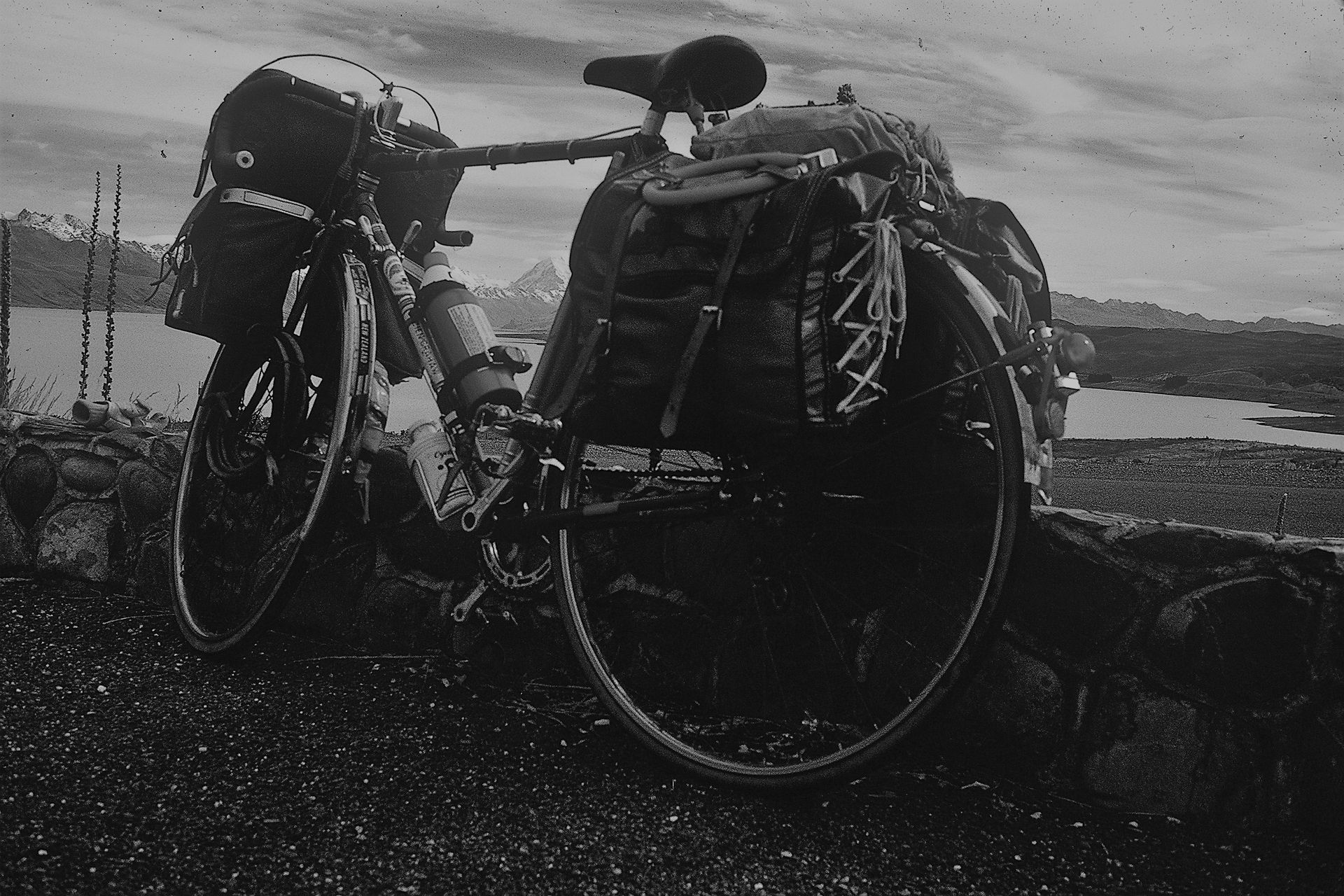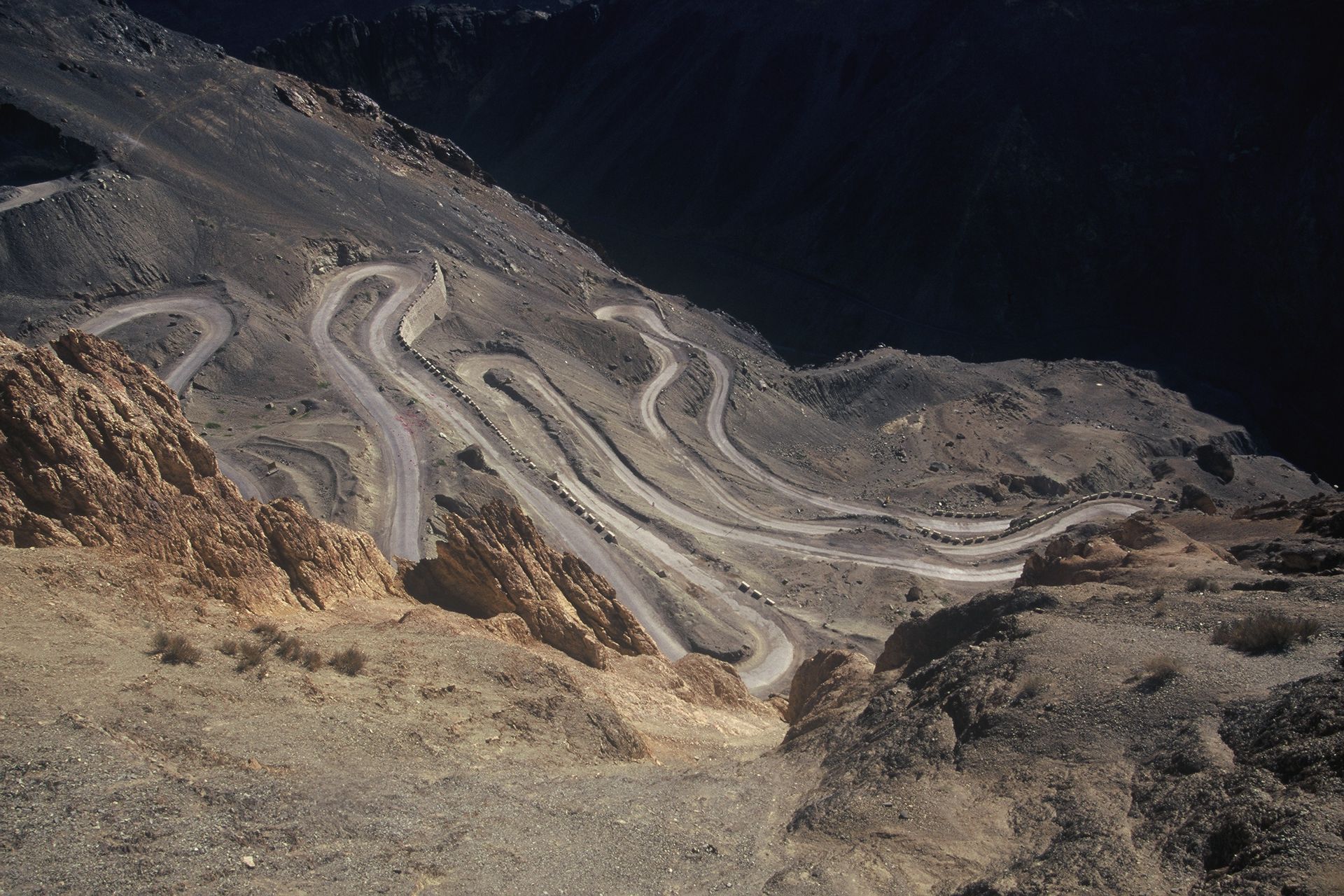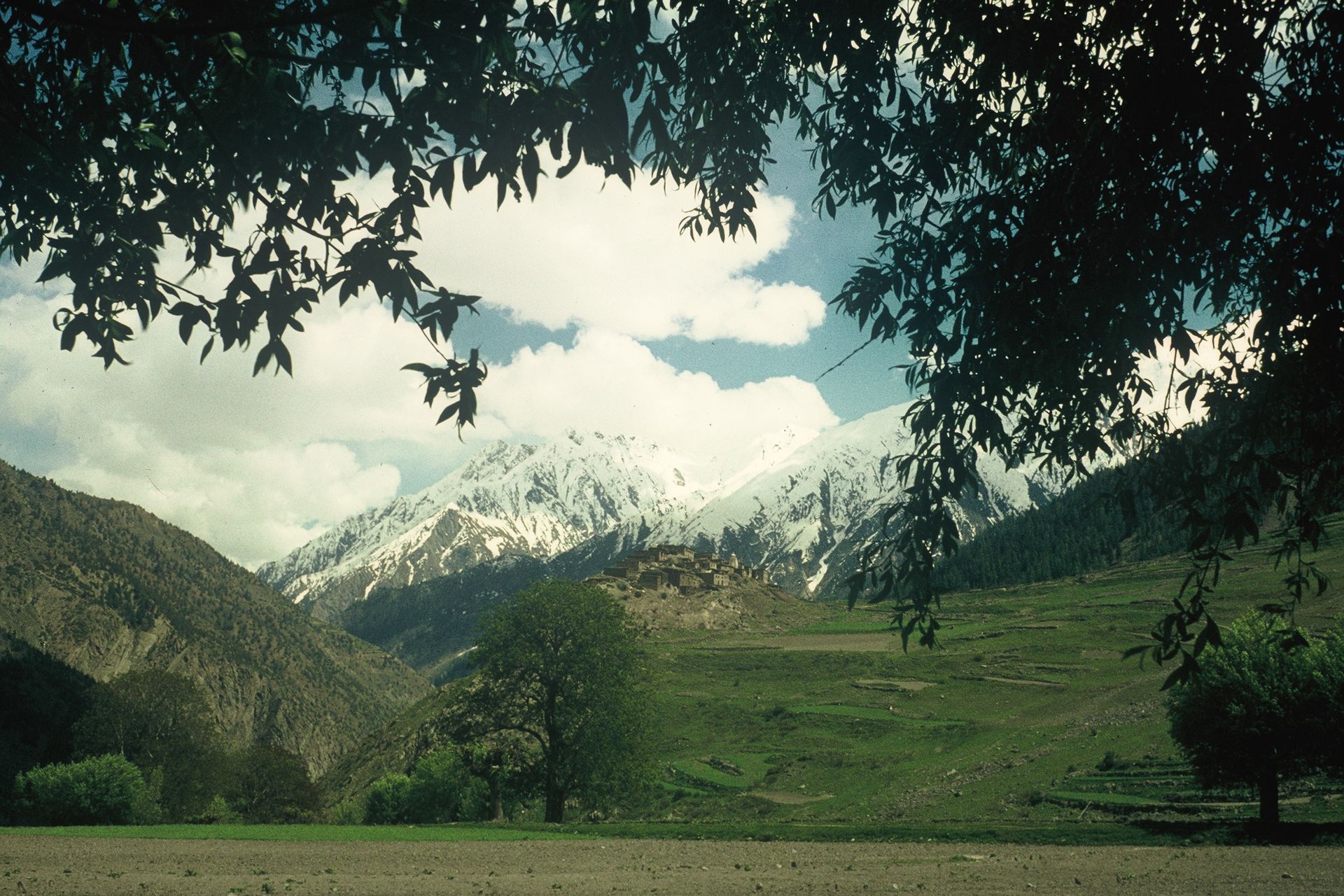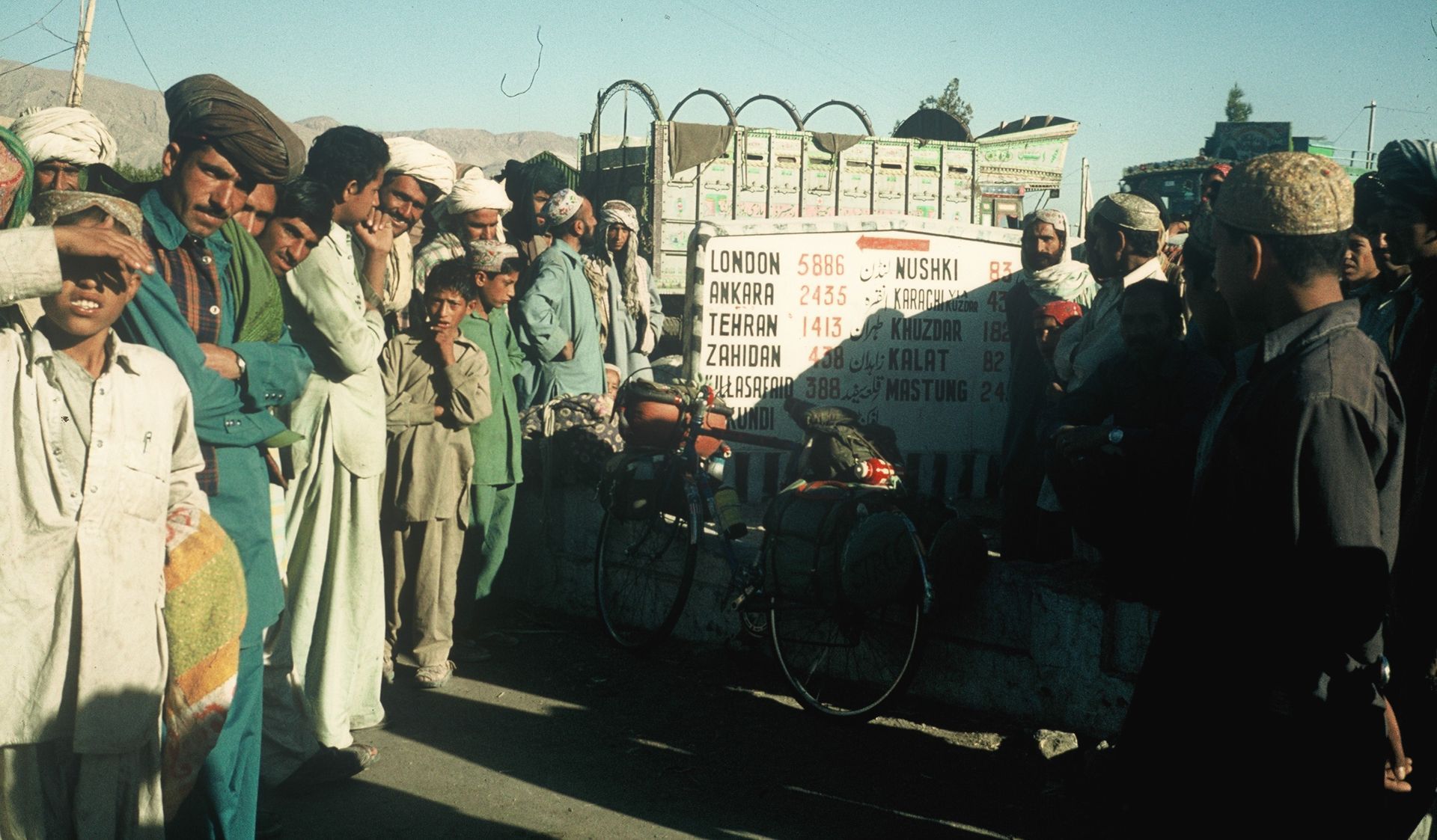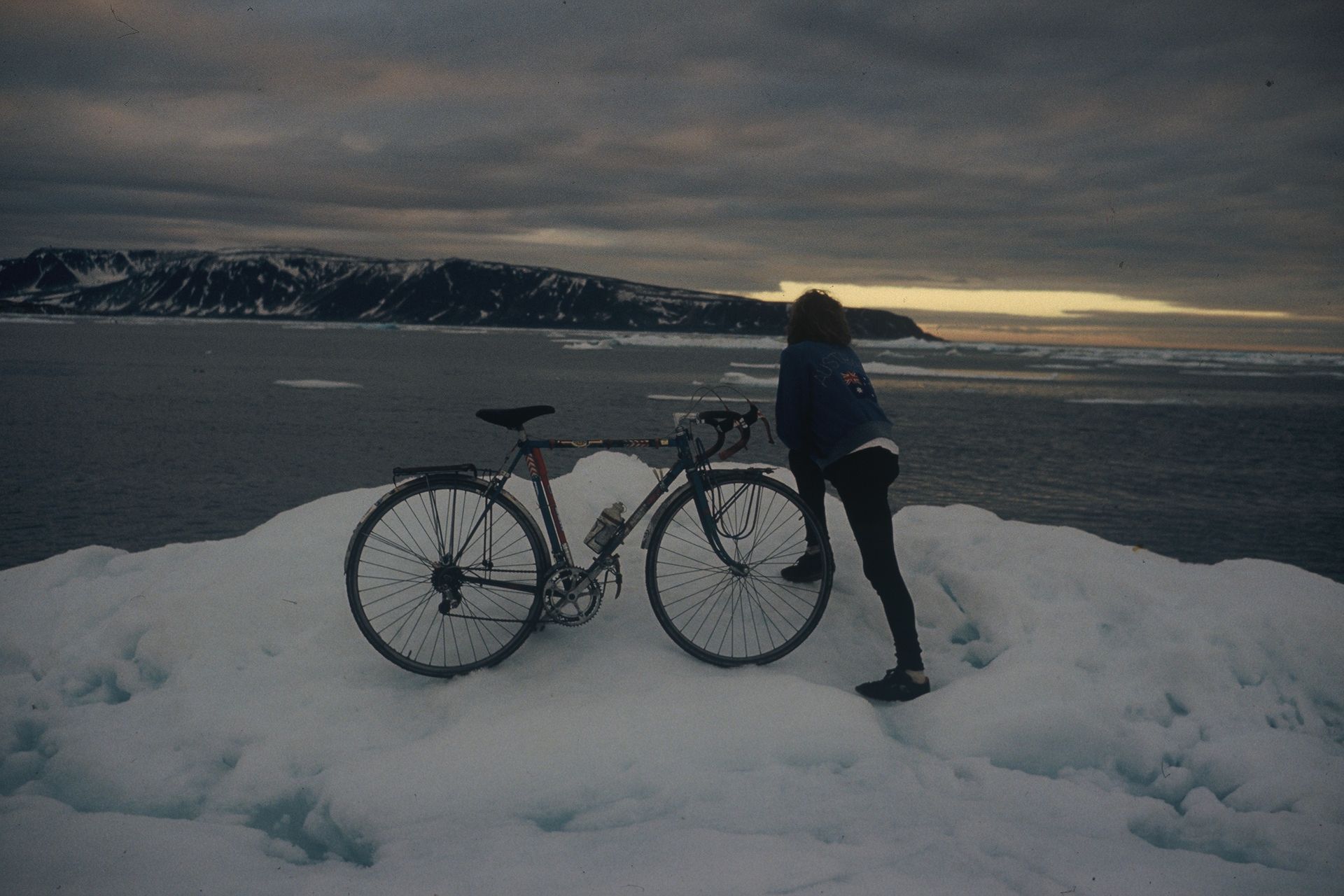Interview in Outsiders April 2023
Interview in Outsiders April 2023
Tilmann Waldthaler
World Cyclist.
Going back to the beginning, what was it that started off your world travels?
I met a man in 1972 who was doing a world tour on a bicycle. I’d never seen anyone do something like that before, so I stopped and we started talking. I was absolutely fascinated by what he was doing, and eventually we became friends. I told him I’d like to go cycling, and he helped me to get my first bicycle. I never intended to do a world tour—I was just fascinated by the way he explained how he arranged his life on the bicycle.
What was it that stood out?
People are searchers—we search for something new—for food, for jobs and for everything, and I thought that riding a bike around the world was maybe something I’d like to do. He went back to visit his friends in Belgium, but before he went he told me he’d bring me a bicycle back from there that would fit me. And when he came back he brought this bicycle with him.
This was up in Darwin, in the north of Australia, so I went on a trip from there to Sydney just to see if I could actually do it, and I was just fascinated by the changes I saw in my body and my mind and everything around me, so I continued. I went down to New Zealand and I worked there as a pastry chef for 18 months, and from there I went to Antarctica, working for the US Navy. When I finished that job four months later, I came back to New Zealand and started my very first big trip—from New Zealand to Norway.
I read about that trip. That sounded like a long one.
It was a very big trip—four and a half years, and 55,000km.
Was that something you planned out—or was it just a case of setting off and seeing where you ended up?
I didn’t have any money—but because I’m a qualified pastry chef I worked in various different hotels and bakeries on the way up to Norway. I had seven different jobs—working in New Zealand, Australia, Indonesia, India, Pakistan, Italy and Norway—where I worked for a Swedish film company—and that’s how I basically made my money in order to continue cycling. As you can imagine, when the road finally finished in Norway I’d enjoyed myself cycling so much, with four and a half years of wonderful experiences, I had to do something else. So I planned to go from the north of Norway down to the Cape of Good Hope in South Africa, but I never arrived down there because I got caught up in a voodoo village in Togo. I was fascinated with the fetishers and voodoos, so I stayed there for 14 months before I ran out of money and had to go back to Europe.
Obviously being able to ride a bike is probably quite important—but doing these trips I imagine it’s maybe even more important to be able to get along with different people. Is that right?
That’s basically what cycling is all about. When you’re out there on your bicycle, you’re by yourself and you have to make contact with people very quickly. I’m a very outgoing person, and I learned very quickly that even if I didn’t speak the language of the people I travelled with, I needed to use body language. We’re not very comfortable doing that, but what do you do if you don’t speak the language
language? You explain to people by showing and making different signs to get across what you mean. It’s a very fascinating way of living and travelling, because everyday I’d have new experiences with different people. Cycling is all about getting to know not just the people or the countryside around you—but to get to know yourself. You have to think very quickly because you get into situations where you’ve got to decide right there and then. You’ve got to keep your body alert and your mind alert. You can get very lonely on a bike if you’re not communicating. I think a lot of cyclists get miserable because they don’t communicate, but it can get very repetitive when you talk to people. “Where have you come from? What is your job? Are you married?” You get those kinds of questions all day when you stop, so I developed ways of making jokes with the people—lots of people like to laugh. And I must say they think I’m a little crazy because I’m cycling. They think I’m crazy, but I’d always have a couple of my books with me, and when you show them the books they become very interested.
Yeah—the book sort of legitimises things a bit. You met your wife whilst on a trip didn’t you?
I met my beautiful wife in the Sahara. She was cycling by herself, on a trip down to Rwanda to work there as a nurse, and we met in Niger. I thought that maybe I could work and travel with her—but she said, “No, I don’t want to travel like you do, I’m just using my bike to get from A-to-B—I’ve got a job in Rwanda so I have to go down there.” And that’s what she did. When she finished I invited her to come and visit me in Italy, where I was living and working. I said, “Look, we met in the Sahara, but we didn’t really get to know each other, so why don’t we do a trip through the Sahara?” So we travelled along the Italian coast, then took a boat over to Africa and travelled all the way to the southernmost point in the Nile.
And presumably it went well as you’re still together.
Yes. She decided to come to Italy, so we lived on a small farmhouse 1,500 metres above sea level. She worked in the little village as a nurse and I developed my cycling into a business—starting to work for the industry.
How did you manage that?
I started to work as a journalist, I did an exam in Italy and got my journalist papers and worked for the local newspaper, and then when I worked in the cycling business, I’d write for magazines. I’d do trade shows too. So for example when I was travelling from Alaska to Patagonia, my sponsors would say, “We’re in Las Vegas and Buenos Aires at bike shows, we’d pay everything for you to come there and talk about what you do.” Cycling the way I did it was kind of unknown at that point—people didn’t really know how to sit on a bicycle and go cycling for two years. And then around the time the mountain bike scene came into existence—the bikes came over from the States and the European industry started to make mountain bikes.
I see—and that’d help fund you around the world?
Yeah—from there I met a lot of people who worked in the industry. I was very fortunate I was at the right time with the right people. The mountain bike industry was very new to Europe, so they thought, “Let’s get this guy on mountain bikes.” There are so many stories of who I met just from cycling… I met Bob Marley, I met Indira Gandhi, I met Niki Lauda—so many famous people because I was riding my bike at the right time.There weren’t many people touring the world on bikes in the 70s. How did it change over the years? On my very first trip I met three cyclists doing what I was doing in four and a half years. And they all came from the UK. But then in 2010 I decided to do the same trip back—from Norway to New Zealand—and as I’d become popular and a lot of people knew me, I said, “Okay, why don’t you come with me.” So they’d come for two or three weeks along the way—they’d accompany me through Thailand or Cambodia. So on that reverse trip I must have met about 50 people.
That’s not a huge number in the scheme of things, but that’s a big increase from three people.
There are just so many more people cycling these days. But one big problem I’ve discovered is that the mentality of people has changed a lot. I had a job—I’m a qualified pastry chef and then I became a journalist, writing articles for all sorts of cycling magazines—but people now have a totally different mentality, saying, “I want to go cycling, but I’ll only go if a company is going to support me. I need sponsors.” You don’t even know when you start a trip if you’re going to finish it—it’s just a dream, and you can’t sell a dream. You’ve got to do something first. I’m very fortunate as a pastry chef, a cook and a journalist that I could use those jobs to survive. I remember when I was travelling through New Zealand once I had $2.50 in my pocket. I knew I could make another day on my bike, and start working the next day—so I went to the hotel and said to the manager, “I’m a world cyclist, I have no more money and I need a job. I’ve got my uniform and my knives in my panniers, would you employ me tomorrow?” And he said, “You’re on.”
It sounds like with this you’ve got to have a lot of faith or confidence that things will work out.
I was very fortunate because I could cook. Cooking supplies food for people, and everybody needs food. I even worked as a cook in India. I had no idea about Indian cooking, so I told the guy at the hotel that I wanted to learn Indian cooking. I said I don’t want any money, I just want to learn how to cook. In all my life I had 48 different jobs. If you go somewhere in Germany or Austria and say, “I’ve had 48 jobs, will you hire me?” They’ll say, “No way! You’re not going to stay here.” So you don’t tell them that—you just tell them you can do the job.
And that’s carried you around the world.
Having the possibility of working and earning your money is maybe the best thing you can have when you travel on a bicycle.
How do you then adjust back into home life when you’re away so much?
Every trip comes to an end sooner or later. People are structured so that they need a rest from what they’re doing—everybody needs a rest to recharge their batteries and work through what they’ve seen and experienced. And I was very fortunate that I could write it down in books—so I could use the time I wasn’t travelling to write books. I see myself like a bucket of water—put it under a tap and when it’s full the water overflows and goes to waste. When you travel and the bucket is full you have to rest somewhere—and I did that by writing books. I could travel for about three years, make notes along the way, then settle down somewhere and collect my ideas and write a book and sell them. And then the time comes when you’ve got to go on another trip.
You mentioned to me earlier about how you live a simple life. Is simplicity important when you’re on your trip?
What cycling has taught me is to become very self-sufficient. When you’re on the bike you know what you need, and what you don’t need. And that makes your life very simple. I have four panniers on the bike, and each pannier has a function. It’s like a house where you’ve got the different rooms. I have my bag with my sleeping bag and my mat—that’s my bedroom, and then I have a kitchen—my front bag on the left with all my kitchen utensils, and then I have my wardrobe, and then the bag on my handlebars is where all my important things are—my passport and my ID papers. I’ve had experiences before with the police where they’ve asked me to show them my passport—and Australian passports are very nice—they have very colourful pages, and they said, “Oh, that’s a very nice passport, can I keep it?” Some of the police just put the passport straight into the top pocket of their shirt.
Have you got to deal with a lot of situations like that?
I have some terrible stories, but when you consider there are 24 hours in a day, and you have a very bad experience, it only lasts maybe two or three minutes, and then it’s done and over with. I learned to just be very direct with people who want things from you. I travelled through Iran during the time when the 52 American hostages were held in the Embassy. Iran was actually a very nice place—they had fast food and supermarkets and everything—so when I arrived I put up my tent in a camping place and went to the supermarket. From the campsite to the supermarket was maybe 500 metres, and I was just outside the supermarket when a car pulled up beside me, the doors opened and a woman jumped out. She said, “Are you American?” I said, “No, why?” Then she pulled out a machine gun from under her dress and said, “That’s why! Show me your passport.” So I showed her my passport and she said, “You’re very lucky, if you were American we’d shoot you dead.” She turned around, threw the passport into the sand and got back into the car. As I looked at her there were four guys leaning out the windows of the car pointing their guns at me, waiting for her to give the order to shoot me. So that was very, very dicey… but what do you do? I didn’t go to the supermarket anyway. The next day I went to the bus-stop to get to Tehran, but the bus wouldn’t take me. So I went to the police station, and they said the best thing was to fly out. So I went to the travel agency, and they wouldn’t take me. I went back to the police and said, “What should I do?” And he said, “Well, you’ve got your own transport—sit on your bicycle and off you go.” And that’s what I did. I went towards Tehran, and it was okay as they’d closed all the motorways to stop the military from travelling on them. So I travelled all by myself on the motorways as they were all closed. It was fantastic. Whenever there was an exit to get into a village, I’d take the exit and camp somewhere
near the motorway. When I got to Tehran I went to the Youth Hostel to stay there. When I asked for a room the man said, “You’re joking! I’ve got 50 beds and 300 people wanting to stay here. All these people from Pakistan and Bengal worked in the oil fields, but because there was a war the oil fields were being bombarded, so they were trying to get home. In the end he had a small room on the roof—this little room for a security guard with a bed and nothing else. So I got that room for the night and observed the bombing through the night. It was horrible, but what do you do? But when you travel for 45 years on a bicycle you have a lot of wonderful experiences.
I imagine there’s constant highs and lows.
When you’re a positive person and you enjoy living and life, the negative aspects become very minute. Like I said, they only last a very short amount of time. And there are so many positive experiences. I’ll never forget meeting Bob Marley. I never thought I’d have a chance of meeting a person like him. It was on my first trip, and I was on a plane from New Zealand to Australia, and suddenly I saw all these people with dreadlocks. Peter Tosh, Rita Marley and Bob Marley were all sat in economy class. I said to the air hostess, “Excuse me, there’s a seat vacant between Peter Tosh and Bob Marley.” So we walked up and I said, “Good day, my name is Tilmann, I’m a world cyclist, would you mind if I sat down next to you?” He said sure, and we chatted the whole way. Just before the plane landed he got up and gave me this beautiful Bob Marley t-shirt. He said, “Here’s a t-shirt for you—take it around the world.” So I did. In the end I gave it to a boy I met in Africa who was an absolute Bob Marley fan—when I told him that Bob Marley gave it to me he went bonkers. And those are the kind of beautiful experiences that always stay with me. In the end, we’re all human beings, and I think the majority of people, if they can give someone else some enjoyment, they will. It’s the small things—whether it’s giving a t-shirt or a smile or a hand-shake. That’s something I’ve learned—it doesn’t matter where you are, but if you’re nice to people, they’ll be nice to you too. It’s easy to be shut off, but if you’re open and friendly, people respond to that. There’s a big difference between arriving somewhere on a bicycle, or arriving in a taxi or a limousine. I stayed 18 months in India cycling, and the people there would use bicycles for their work. They’d sharpen knives, and they had grindstones on the back of the bicycles, so when they pushed the pedals they’d sharpen their knives. They had a lot of pride in their bicycles. They had these beautiful bells, and one man had this Mercedes star on the front. I remember asking why he had that, and he said, “Because this is my Mercedes.”
It seems like the bicycle is really embraced in these places.
In Africa or Asia a bicycle is really something very special. The kids use it to go to school, or the men use them to get to work, or they’re used to carry things—musical instruments or coconuts or things they make in the villages that they take to the market. In some places they use monkeys to protect the things on the bicycle, because the monkeys eat grass and get bacteria in their teeth, so when they bite people they transmit diseases, so kids are scared of monkeys. So in Africa I got a monkey and had it travelling with me on my bicycle. I trained it to sit on the bicycle when I was going shopping or eating somewhere. I’d put the bicycle where I could see it, and the monkey would sit there. But he was very clever. When he saw that I was pumping my tires up, he noticed that I was opening up the valve on the tube. I noticed that my tires were flat when I came back to my bike, so I observed, and I realised that the monkey was clever—he’d open up the valve to get the air to blow in his face and cool him down. So I had a problem, because the monkey was deflating my tires!
Haha—that seems like a nice way to wrap our conversation up. Have you got any wise words to end this with?
Don’t listen to other people. A lot of people want to cycle or do a trip, and a lot of times friends and family tell them not to. My brothers and sisters said to me, “Oh, that’s no life, why don’t you get a decent job?” But I said, “I’m a different person—I want to do what I want to do, it’s my life.” I think it’s very important for people to do what they want to do. You’re only on this world once. How many times have I heard people say, “If I would have had the chance, I would have done this.”? Well, don’t worry about what other people say, just do it.

